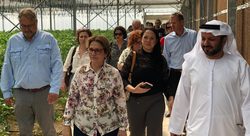ANBA 21/09/2019
Brazilians go to a desert farm
The delegation led by Brazil’s Agriculture minister Tereza Cristina made a visit to a property where fruit and vegetables are grown in desert-climate Abu Dhabi.
Press Release by Isaura Daniel
São Paulo – Brazilian agricultural industry delegates currently in the UAE saw a farm this Saturday (21) where tomato, mango, banana, lemon, potato, corn, eggplant and a myriad of other plant and livestock products in the desert lands of Abu Dhabi.
Led by Brazil’s Agriculture, Livestock and Supply minister Tereza Cristina, the delegation was welcomed by executives with company Elite Agro, including CEO Abdulmonem Al Marzooqi and Food and Agriculture division CEO Ian Summerfield. They farm they visited is Elite Agro’s Al Adla.
Besides the UAE, the group operates in countries including Serbia, Morocco, Ethiopia and Mauritania, and Tereza Cristina prompted them to invest in Brazil. The Brazilians were impressed with the plantations in the desert. Here at Al Adla, techniques for growing produce at high temperatures and in bad soil are many, from drip and center-pivot irrigation to climate-controlled greenhouses.
Brazilian Agriculture and Livestock Confederation (CNA) International Relations superintendent Lígia Dutra, who’s one of the delegates, says the technologies they saw are also employed in Brazil. “We’ll use a lot of greenhousing for vegetables and legumes in Brazil. Irrigation is not yet where it could be, but we do have irrigation technologies. Irrigation is a prevalent technology in Brazil. What’s newest to us here is this soil, which is pure sand, and they have to correct for it, to add the nutrients,” says Lígia.
Arab Brazilian Chamber of Commerce president Rubens Hannun, who’s also a delegate, said the farm’s a lesson that even without the necessary natural conditions in place, you can make things work by having and seeking the tools you need. “They’ll bring in the water and treat it, they’ll make the weather suitable,” says Hannun. The irrigation is mostly desalinated seawater.
Translated by Gabriel Pomerancblum
Brazilians go to a desert farm
The delegation led by Brazil’s Agriculture minister Tereza Cristina made a visit to a property where fruit and vegetables are grown in desert-climate Abu Dhabi.
Press Release by Isaura Daniel
São Paulo – Brazilian agricultural industry delegates currently in the UAE saw a farm this Saturday (21) where tomato, mango, banana, lemon, potato, corn, eggplant and a myriad of other plant and livestock products in the desert lands of Abu Dhabi.
Led by Brazil’s Agriculture, Livestock and Supply minister Tereza Cristina, the delegation was welcomed by executives with company Elite Agro, including CEO Abdulmonem Al Marzooqi and Food and Agriculture division CEO Ian Summerfield. They farm they visited is Elite Agro’s Al Adla.
Besides the UAE, the group operates in countries including Serbia, Morocco, Ethiopia and Mauritania, and Tereza Cristina prompted them to invest in Brazil. The Brazilians were impressed with the plantations in the desert. Here at Al Adla, techniques for growing produce at high temperatures and in bad soil are many, from drip and center-pivot irrigation to climate-controlled greenhouses.
Brazilian Agriculture and Livestock Confederation (CNA) International Relations superintendent Lígia Dutra, who’s one of the delegates, says the technologies they saw are also employed in Brazil. “We’ll use a lot of greenhousing for vegetables and legumes in Brazil. Irrigation is not yet where it could be, but we do have irrigation technologies. Irrigation is a prevalent technology in Brazil. What’s newest to us here is this soil, which is pure sand, and they have to correct for it, to add the nutrients,” says Lígia.
Arab Brazilian Chamber of Commerce president Rubens Hannun, who’s also a delegate, said the farm’s a lesson that even without the necessary natural conditions in place, you can make things work by having and seeking the tools you need. “They’ll bring in the water and treat it, they’ll make the weather suitable,” says Hannun. The irrigation is mostly desalinated seawater.
Translated by Gabriel Pomerancblum












